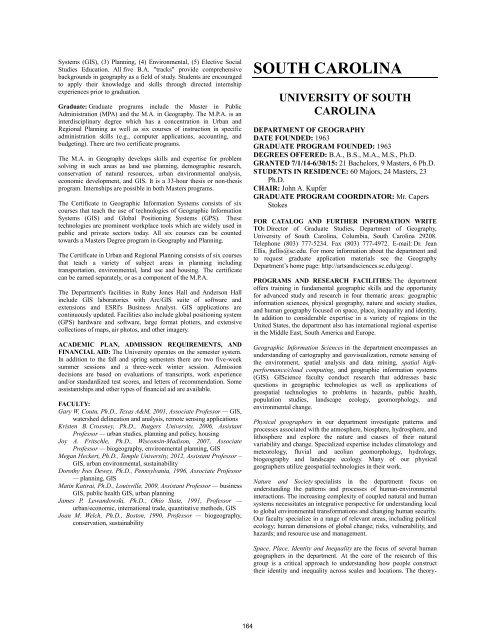AAG
20152016_Guide_to_Geography_Programs_in_the_Americas
20152016_Guide_to_Geography_Programs_in_the_Americas
Create successful ePaper yourself
Turn your PDF publications into a flip-book with our unique Google optimized e-Paper software.
Systems (GIS), (3) Planning, (4) Environmental, (5) Elective Social<br />
Studies Education. All five B.A. "tracks" provide comprehensive<br />
backgrounds in geography as a field of study. Students are encouraged<br />
to apply their knowledge and skills through directed internship<br />
experiences prior to graduation.<br />
Graduate: Graduate programs include the Master in Public<br />
Administration (MPA) and the M.A. in Geography. The M.P.A. is an<br />
interdisciplinary degree which has a concentration in Urban and<br />
Regional Planning as well as six courses of instruction in specific<br />
administration skills (e.g., computer applications, accounting, and<br />
budgeting). There are two certificate programs.<br />
The M.A. in Geography develops skills and expertise for problem<br />
solving in such areas as land use planning, demographic research,<br />
conservation of natural resources, urban environmental analysis,<br />
economic development, and GIS. It is a 33-hour thesis or non-thesis<br />
program. Internships are possible in both Masters programs.<br />
The Certificate in Geographic Information Systems consists of six<br />
courses that teach the use of technologies of Geographic Information<br />
Systems (GIS) and Global Positioning Systems (GPS). These<br />
technologies are prominent workplace tools which are widely used in<br />
public and private sectors today. All six courses can be counted<br />
towards a Masters Degree program in Geography and Planning.<br />
The Certificate in Urban and Regional Planning consists of six courses<br />
that teach a variety of subject areas in planning including<br />
transportation, environmental, land use and housing. The certificate<br />
can be earned separately, or as a component of the M.P.A.<br />
The Department's facilities in Ruby Jones Hall and Anderson Hall<br />
include GIS laboratories with Arc/GIS suite of software and<br />
extensions and ESRI's Business Analyst. GIS applications are<br />
continuously updated. Facilities also include global positioning system<br />
(GPS) hardware and software, large format plotters, and extensive<br />
collections of maps, air photos, and other imagery.<br />
ACADEMIC PLAN, ADMISSION REQUIREMENTS, AND<br />
FINANCIAL AID: The University operates on the semester system.<br />
In addition to the fall and spring semesters there are two five-week<br />
summer sessions and a three-week winter session. Admission<br />
decisions are based on evaluations of transcripts, work experience<br />
and/or standardized test scores, and letters of recommendation. Some<br />
assistantships and other types of financial aid are available.<br />
FACULTY:<br />
Gary W. Coutu, Ph.D., Texas A&M, 2001, Associate Professor — GIS,<br />
watershed delineation and analysis, remote sensing applications<br />
Kristen B. Crossney, Ph.D., Rutgers University, 2006, Assistant<br />
Professor — urban studies, planning and policy, housing<br />
Joy A. Fritschle, Ph.D., Wisconsin-Madison, 2007, Associate<br />
Professor — biogeography, environmental planning, GIS<br />
Megan Heckert, Ph.D., Temple University, 2012, Assistant Professor –<br />
GIS, urban environmental, sustainability<br />
Dorothy Ives Dewey, Ph.D., Pennsylvania, 1996, Associate Professor<br />
— planning, GIS<br />
Matin Katirai, Ph.D., Louisville, 2009, Assistant Professor — business<br />
GIS, public health GIS, urban planning<br />
James P. Lewandowski, Ph.D., Ohio State, 1991, Professor —<br />
urban/economic, international trade, quantitative methods, GIS<br />
Joan M. Welch, Ph.D., Boston, 1990, Professor — biogeography,<br />
conservation, sustainability<br />
SOUTH CAROLINA<br />
UNIVERSITY OF SOUTH<br />
CAROLINA<br />
DEPARTMENT OF GEOGRAPHY<br />
DATE FOUNDED: 1963<br />
GRADUATE PROGRAM FOUNDED: 1963<br />
DEGREES OFFERED: B.A., B.S., M.A., M.S., Ph.D.<br />
GRANTED 7/1/14-6/30/15: 21 Bachelors, 9 Masters, 6 Ph.D.<br />
STUDENTS IN RESIDENCE: 60 Majors, 24 Masters, 23<br />
Ph.D.<br />
CHAIR: John A. Kupfer<br />
GRADUATE PROGRAM COORDINATOR: Mr. Capers<br />
Stokes<br />
FOR CATALOG AND FURTHER INFORMATION WRITE<br />
TO: Director of Graduate Studies, Department of Geography,<br />
University of South Carolina, Columbia, South Carolina 29208.<br />
Telephone (803) 777-5234. Fax (803) 777-4972. E-mail: Dr. Jean<br />
Ellis, jtellis@sc.edu. For more information about the department and<br />
to request graduate application materials see the Geography<br />
Department’s home page: http://artsandsciences.sc.edu/geog/.<br />
PROGRAMS AND RESEARCH FACILITIES: The department<br />
offers training in fundamental geographic skills and the opportunity<br />
for advanced study and research in four thematic areas: geographic<br />
information sciences, physical geography, nature and society studies,<br />
and human geography focused on space, place, inequality and identity.<br />
In addition to considerable expertise in a variety of regions in the<br />
United States, the department also has international regional expertise<br />
in the Middle East, South America and Europe.<br />
Geographic Information Sciences in the department encompasses an<br />
understanding of cartography and geovisualization, remote sensing of<br />
the environment, spatial analysis and data mining, spatial highperformance/cloud<br />
computing, and geographic information systems<br />
(GIS). GIScience faculty conduct research that addresses basic<br />
questions in geographic technologies as well as applications of<br />
geospatial technologies to problems in hazards, public health,<br />
population studies, landscape ecology, geomorphology, and<br />
environmental change.<br />
Physical geographers in our department investigate patterns and<br />
processes associated with the atmosphere, biosphere, hydrosphere, and<br />
lithosphere and explore the nature and causes of their natural<br />
variability and change. Specialized expertise includes climatology and<br />
meteorology, fluvial and aeolian geomorphology, hydrology,<br />
biogeography and landscape ecology. Many of our physical<br />
geographers utilize geospatial technologies in their work.<br />
Nature and Society specialists in the department focus on<br />
understanding the patterns and processes of human-environmental<br />
interactions. The increasing complexity of coupled natural and human<br />
systems necessitates an integrative perspective for understanding local<br />
to global environmental transformations and changing human security.<br />
Our faculty specialize in a range of relevant areas, including political<br />
ecology; human dimensions of global change; risks, vulnerability, and<br />
hazards; and resource use and management.<br />
Space, Place, Identity and Inequality are the focus of several human<br />
geographers in the department. At the core of the research of this<br />
group is a critical approach to understanding how people construct<br />
their identity and inequality across scales and locations. The theory-<br />
164


